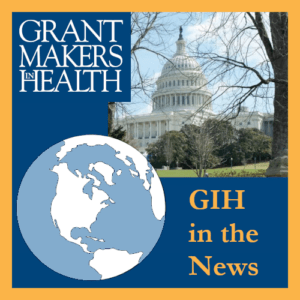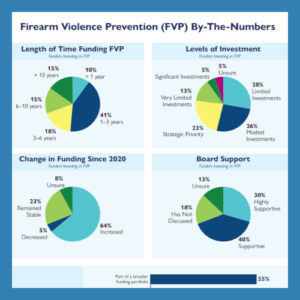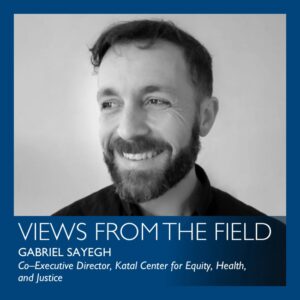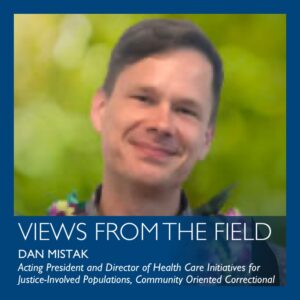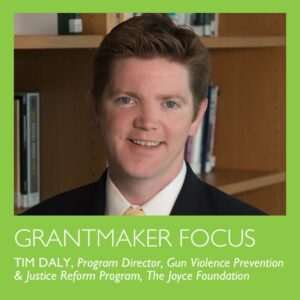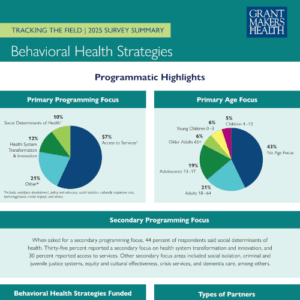Upcoming Events
Past Events
Explore Health Equity and Social Justice Topics
Recent Items - Climate and Environmental Health
Recent Items - Health Equity
Recent Items - Healthy Eating/Active Living
Kate B. Reynolds Charitable Trust: October 2025
Recent Items - Housing
Marin Community Foundation: October 2024
Horizon Foundation: September 2024
Recent Items - Justice Reform
Recent Items - Social Determinants of Health
North Carolina Healthcare Foundation: January 2026
Marin Community Foundation: October 2024
Recent Items - Violence Prevention
The Joyce Foundation
Latest Resources
Maternal Mental Health Equity Fund: November 2023
MMHEF will be investing in a national cohort of organizations and leaders from within communities—and across the country—who are delivering models of care that are built in and by Black, Indigenous, People of Color (BIPOC) communities. Proposals are due by Friday, January 12, 2024
Health Leads: November 2023
Leaders of U.S. community-based organizations are encouraged to apply and participate in our 10-week Makers Residency. Participants will receive funding, coaching, resources, peer support and connection, and technical assistance. Applications are due by Friday, January 5, 2024.
Lessons from an Equity Toolkit Workshop: Facilitator Perspective on Participatory Engagement
The Blue Shield of California Foundation is a long-time multisector collaborative funder with a health equity focus. Increasingly, we find that multisector collaboratives are a powerful vehicle to change systems toward racial equity. We heard from our partners and grantees a strong need for tools and resources that provide several outcomes: to establish equity at the collaborative level, to outline an arc of learning to help place a collaborative on an equity spectrum, and to provide tools to help collaboratives move deeper into equity. To support this work, the Equity in Collaboration Toolkit was developed in partnership with Cristobal Consulting. Its goal is to help multisector collaboratives see where they are taking concrete actions to center equity—and where they are not—through an embedded equity assessment.an embedded equity assessment.
Foundation for Opioid Response Efforts: October 2023
The Foundation for Opioid Response Efforts released the 5 Years of Accelerating Solutions report that outlines the foundation’s initial years of impactful grantmaking. The foundation has awarded 100 grants totaling $39 million across the U.S. to organizations and initiatives combatting the opioid crisis.
Appalachia Funders Network: October 2023
Appalachia Funders Network shared the results from a recently completed asset scan of the six-state, 257-county region, noting opportunities for philanthropic investment. The goal of the asset scan was to create a data-informed framework for funders that would guide targeted investments in Central Appalachia.
Strengthening a National Field of Practice for Climate, Health, and Equity: Learning What it Takes
When The Kresge Foundation’s Climate Change, Health and Equity (CCHE) initiative launched in 2018, community power mobilization was integral because too often the people closest to viable climate resilience solutions were excluded from decisionmaking. Since then, the leadership of CCHE’s community-based, health practitioner, and health institution partners has underscored the significance of community power to transform climate policy and public health practice.
Reports and Publications
GIH Bulletin: January/February 2026
One year ago, as we were just one month into the new administration, I wrote that “At a moment when so much has been described as ‘unprecedented,’ and so much of what we value is being attacked, we need to ask ourselves as individuals, organizations, and a field, what do we stand for? What values do we hold, and what will we do and say to defend them?” Today, the answers to these questions are needed more urgently than ever.
GIH Bulletin: November/December 2025
GIH President and CEO, Cara V. James, delivered these remarks on Protecting the Freedom to Give at the closing of the 2025 Health Policy Exchange, in Arlington, Virginia.
Behavioral Health Strategies
GIH conducted a survey in late 2024 on funder engagement in behavioral health. This fact sheet, based on a sample of 139 health funders, summarizes the current trends, gaps, successes and challenges for funders. It also highlights philanthropy’s continued commitment to behavioral health while also signaling concern about the upcoming funding environment.
Strengthen your knowledge, skills, and capacity.
GIH focuses our programming around five areas that are critical to achieving better health for all.
We invite you to explore the resources available on our focus areas pages, browse content in more specific issue areas, and to connect with GIH staff to discuss how we can partner and support your work.




